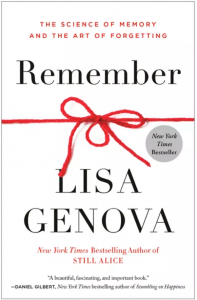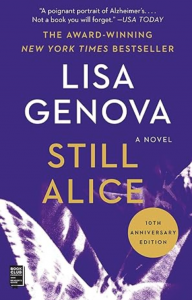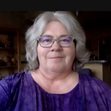Don’t forget to remember!

As a professional organizer it was part of my job to help people find ways to remember stuff:
Where are my keys?Where does this go?How do I remember tasks?Why do I forget appointments?Why can I never find the remote?Together, we created solutions and systems ala takeaways #2, 8, 9 in the list below.
Often they worry that forgetting things is a sign of Alzheimer’s. So, one time I wrote a blog post called “No, you don’t have Alzheimer’s!” Then I got a client who was worried about getting the dreaded disease on the basis that it ran in her family. Oops. I didn’t want to be flippant about it. So I renamed the blog post Getting Organized Prevents Memory Loss. Which isn’t quite right either. I mean, if you really do have it, getting organized will help…a lot…for awhile…
The post included a couple of statistics about Alzheimers, and why you probably don’t have it, but, well, I’m no neuroscientist.
Enter Lisa Genova, who is a neuroscientist.
It's comforting to know that forgetting is normal, but it helps to understand why it happens and what we can do to remember important things.
Click To Tweet
 Many years ago I read, and loved, Lisa’s novel Still Alice. It chronicles fictional Alice’s descent into Alzheimers, so yeah, it’s sad. But it’s also funny, and touching, and ever-so-insightful. Eventually, Juliette Moore won an Oscar for playing the movie version of Alice, which I also recommend.
Many years ago I read, and loved, Lisa’s novel Still Alice. It chronicles fictional Alice’s descent into Alzheimers, so yeah, it’s sad. But it’s also funny, and touching, and ever-so-insightful. Eventually, Juliette Moore won an Oscar for playing the movie version of Alice, which I also recommend.
But I didn’t know the author was an actual neuroscientist until I learned about her 2021 book called Remember: The Science of Memory and the Art of Forgetting.
I uncharacteristically chose the book for my book club without having read it first. I figured if a neuroscientist could write Still Alice, her non-fiction book might also be quite readable. And I was right! We just met and discussed it, so I’m writing this now before I — ahem — forget what I want to say about it.
My goal was to help everyone (including myself) to feel better about forgetting stuff, while also gaining insight into why it happens and what we can do when it’s important to remember.
My main takeaways
Forgetting is normal. Yes, it happens more with age, but that doesn’t mean you have Alzheimers. (See? I was right!) Can you imagine how cluttered your brain would be if you never forgot anything? (Lisa describes a few people like that in the book and it’s not as fun as you might think.)
You can’t remember something you never paid attention to in the first place, like where your car is parked. (Solution: Pay attention. Be mindful. Easier said than done, but worth it.)
Not being able to find your keys is normal. (Solution: Create a “home” for them and pay attention when you set them down.) Finding them in the refrigerator might indicate a problem. You probably do have Alzheimer’s if you look at your keys and don’t know what they are for.
Everyone in the book club agreed that the book has made them feel more forgiving of themselves when they forget things. They now have more tools for remembering. And it has made them more understanding of others who forget. It’s comforting to know that forgetting is normal, but it helps to know why it happens and what we can do to remember important things.
More takeaways
Here are the top 10 takeaways from Remember according to the terrific Book Club Kit on Lisa Genova’s website (please think of this as a preview and read the whole book if you’re the least bit interested in this subject):
Effective remembering often requires forgetting.Attention is essential for creating a memory of anything. You can’t remember what you didn’t pay attention to.We don’t remember most of our lives.A full night’s sleep enhances your ability to establish long-term memories and reduces your risk of Alzheimer’s.Your memories of what happened are full of additions, omissions, elaborations, and errors.Being chronically stressed about your memory will impair it.Emotional experiences are better remembered than neutral ones.Repetition makes your memories stronger.Prospective memory is your memory for what you need to do later. Our brains are terrible at this. Use To-Do lists, calendars, and sticky notes instead of your brain.We remember what is meaningful.My Goodreads rating: 5 stars! *****
Book Club discussion rating: Excellent!
Alzheimer’s
Although two of the eighteen book chapters are about Alzheimer’s, this section of the post is from me, not from Lisa Genova.
As the Alzheimer’s Association website states:
There is no single test that can determine if a person is living with Alzheimer’s or another dementia. Physicians use diagnostic tools combined with medical history and other information, including neurological exams, cognitive and functional assessments, brain imaging (MRI, CT, PET) and cerebrospinal fluid or blood tests to make an accurate diagnosis.
The website goes on to list a number of types of available tests, treatments, and additional helpful information.
And, because I’m a genealogist with an interest in DNA testing, of course I Googled “Alzheimer’s DNA test”. As the National Institute on Aging website states:
In most cases, Alzheimer’s does not have a single genetic cause. Instead, it can be influenced by multiple genes in combination with lifestyle and environmental factors. Consequently, a person may carry more than one genetic variant or group of variants that can either increase or reduce the risk of Alzheimer’s.
Importantly, people who develop Alzheimer’s do not always have a history of the disease in their families. Still, those who have a parent or sibling diagnosed with the disease have a higher risk of developing Alzheimer’s than those without that association.
So, it sounds like DNA testing would be less than conclusive.
I understand that getting oneself tested, in whatever way, can be super-scary. But if my family had a history of it, I would want to know where I stand. And I would want to learn as much as possible about the latest treatments. If drugs would allow me to maintain my current cognitive level I would take them. But, for the record, if I had deteriorated to the point where I couldn’t even make these sorts of decisions for myself, I would not want drugs to prolong my life.
Memory Roundup
For your convenience — and mine —I have gathered a number of my previous blog posts related to memory. (I could have suggested that you search my site for the keyword “memory”, but that list would also include all the posts about memorializing loved ones, organizing keepsakes, and leaving a legacy.)
Getting Organized Prevents Memory Loss
Wanna know my #1 time management tip?
It’s All About the Labels (not the label makers)
What is Your Clutter Costing You?
How to Live and Work by Design, not by Default
Why do I take before and after photos?
This Photo Trick Cures Clutter Amnesia!
More mindfulness. Less clutter.
If you can’t find something, clean up!
There’s no Reason to Freak out…Unless…
Do you have trouble remembering, and do you worry about forgetting?
Are you familiar with Lisa Genova? Might you read her book(s)?
What memory tricks do you like and want to share with us in the comments below?
______________________________________________________Hazel Thornton is an author, genealogist, and retired home and office organizer.Hung Jury: The Diary of a Menendez Juror What’s a Photo Without the Story? How to Create Your Family Legacy Go With the Flow! The Clutter Flow Chart Workbook Feel free to link directly to this post! Click here to ask about other uses.Copyright 2024 by Hazel Thornton, Organized for Life and Beyond
___________________________________________________________
.
The post Don’t forget to remember! appeared first on Hazel Thornton.



